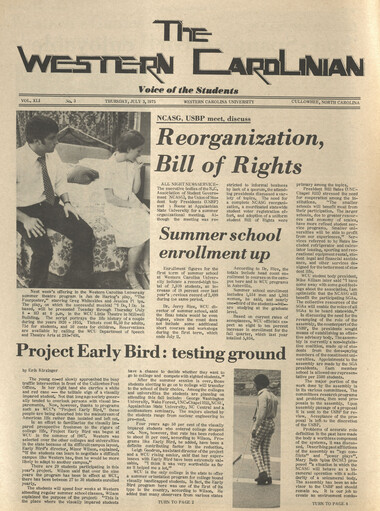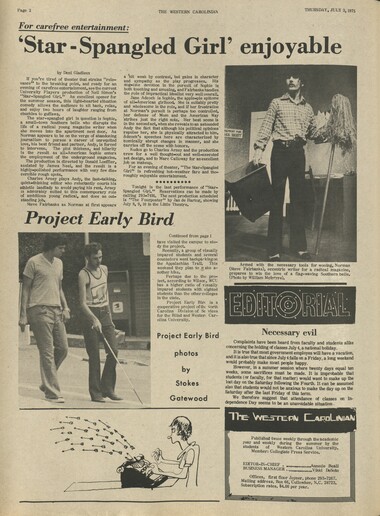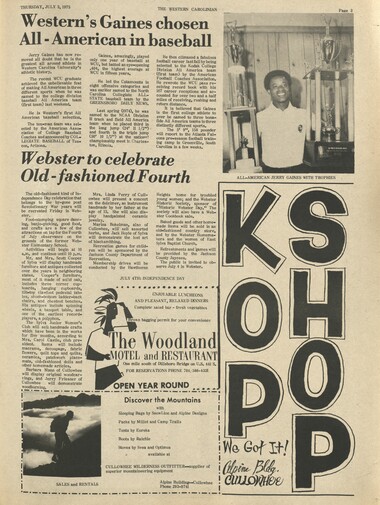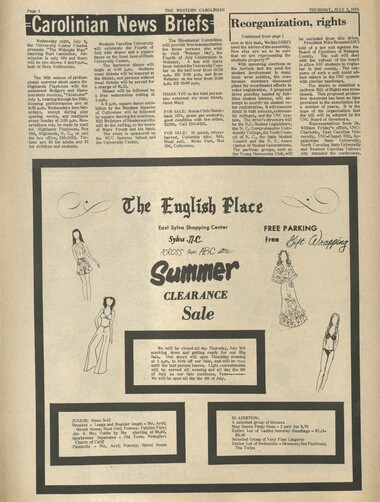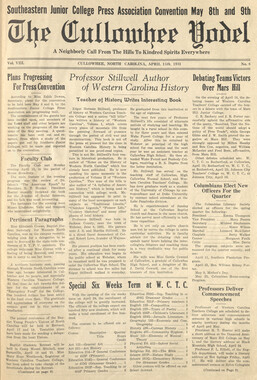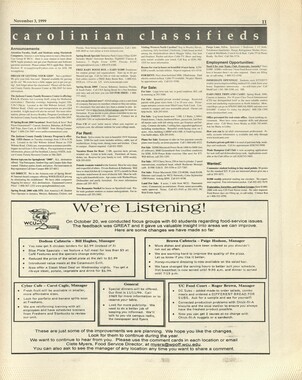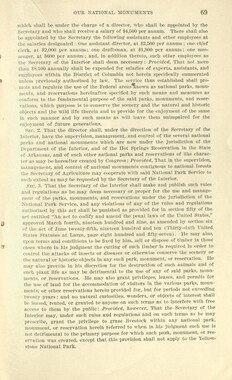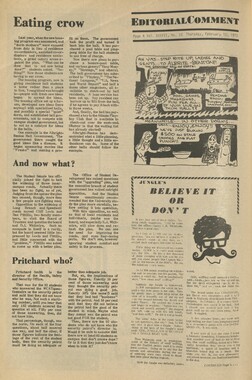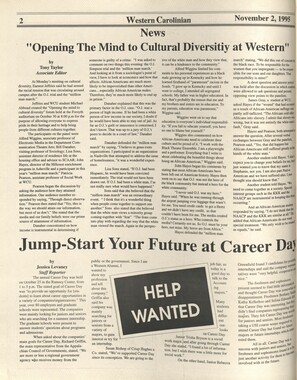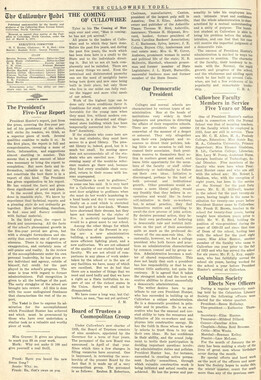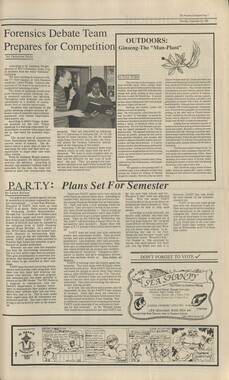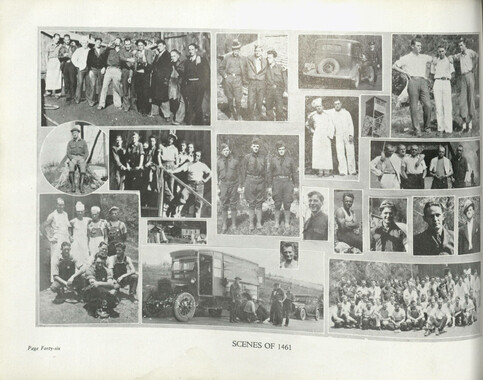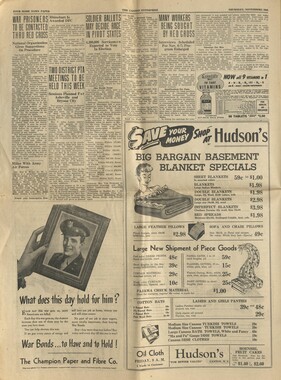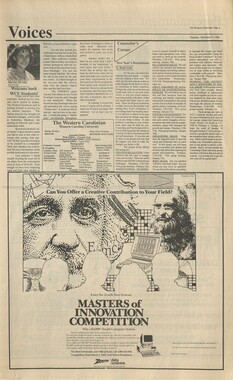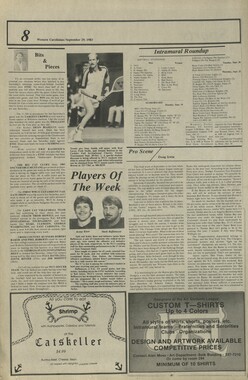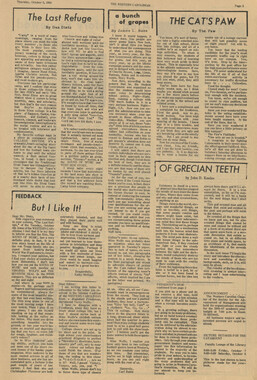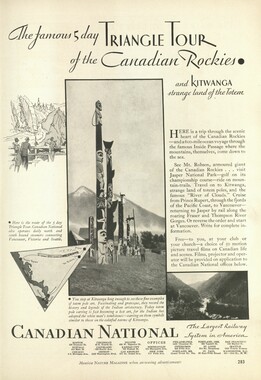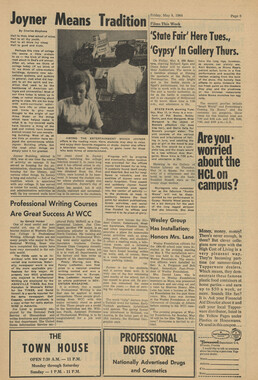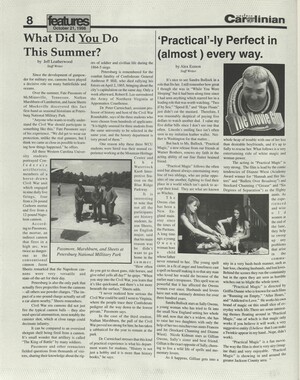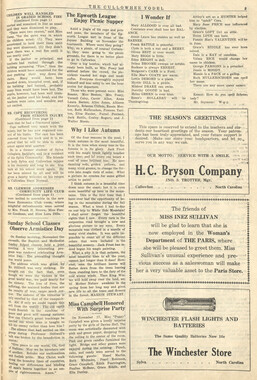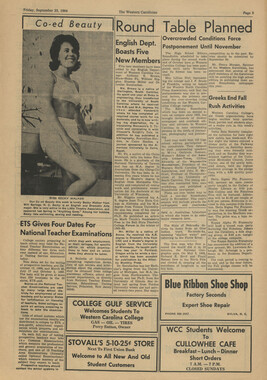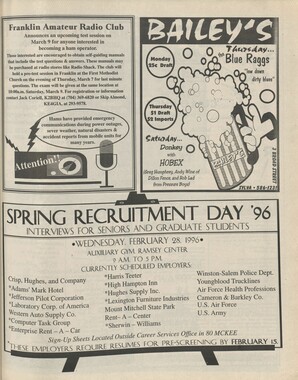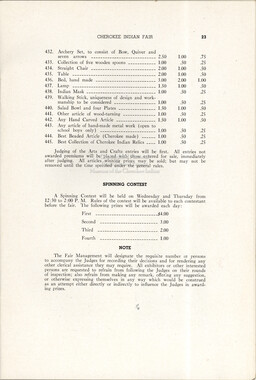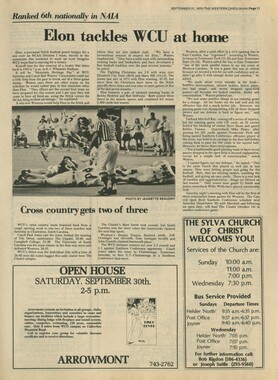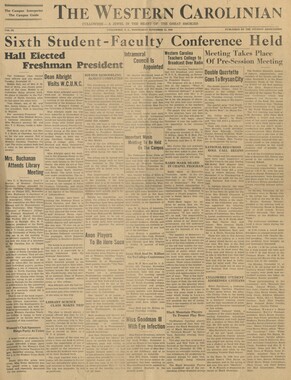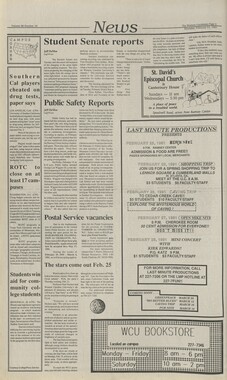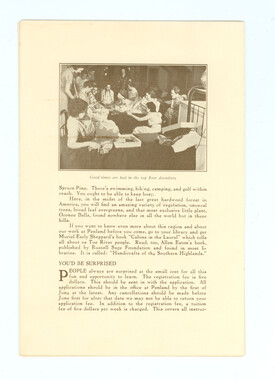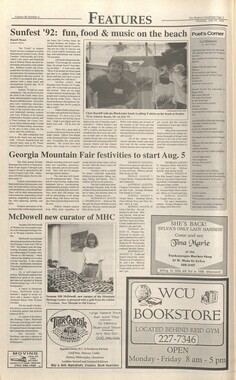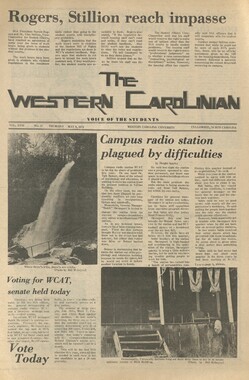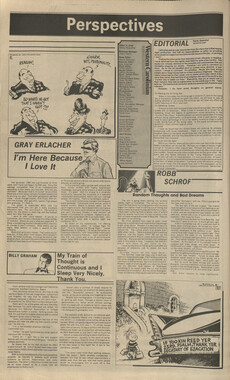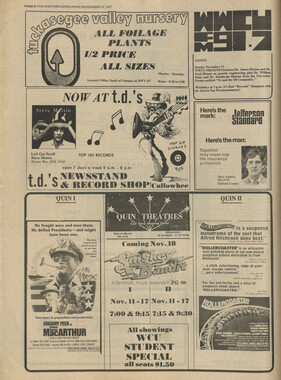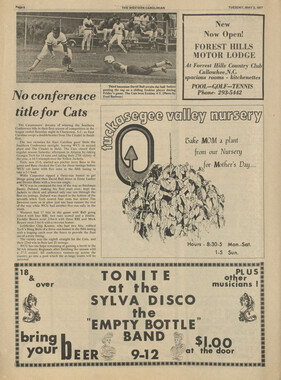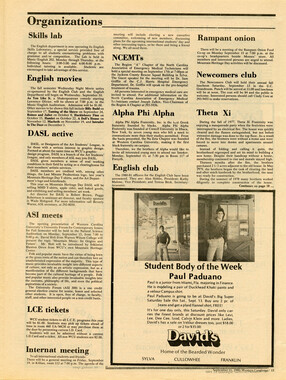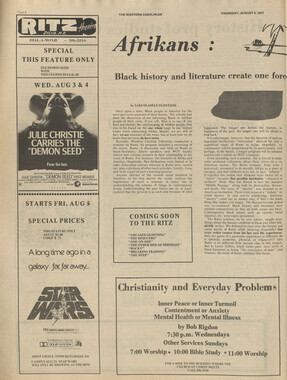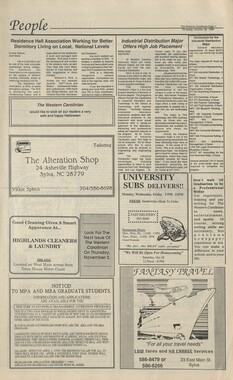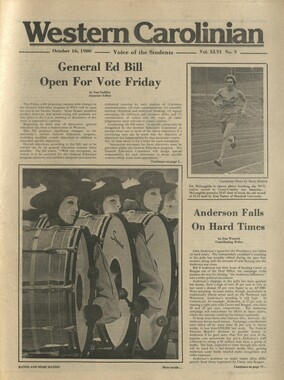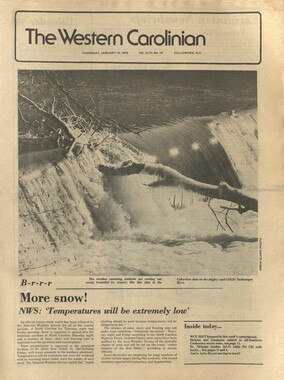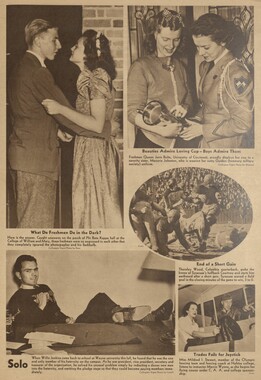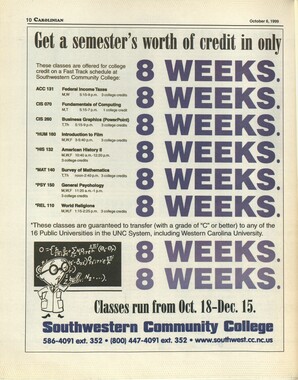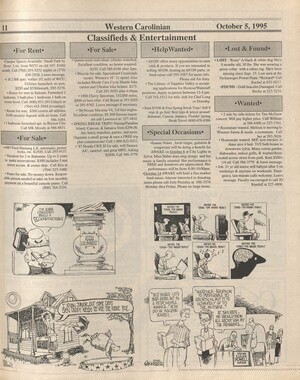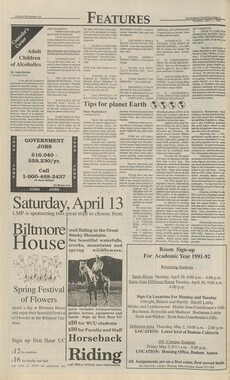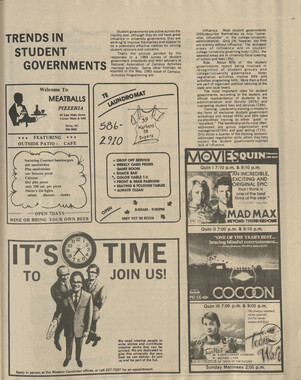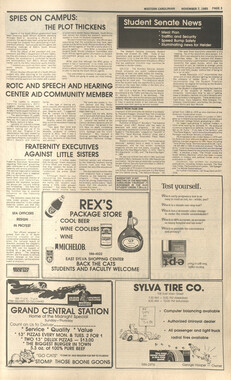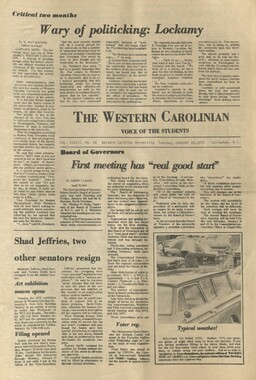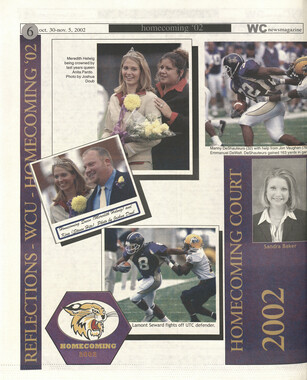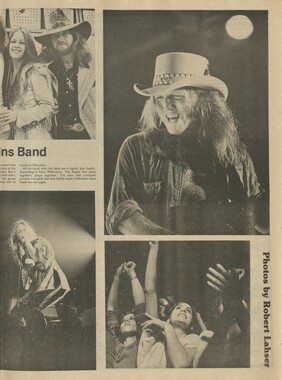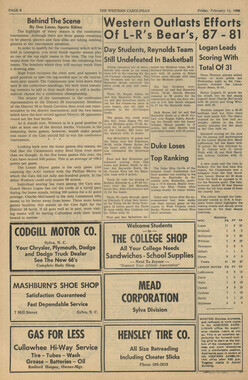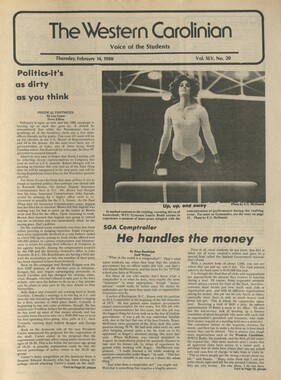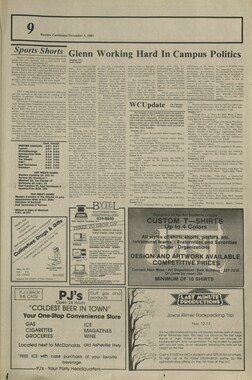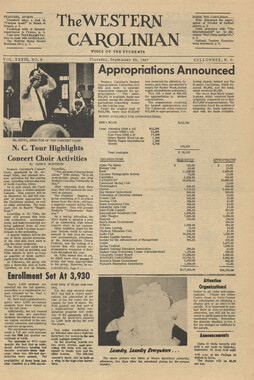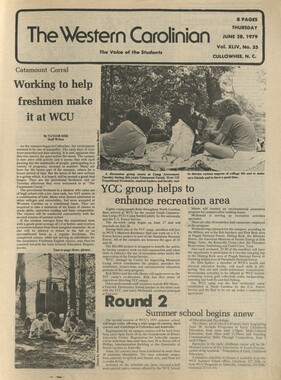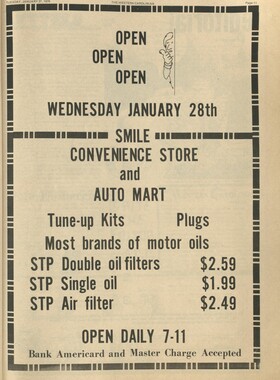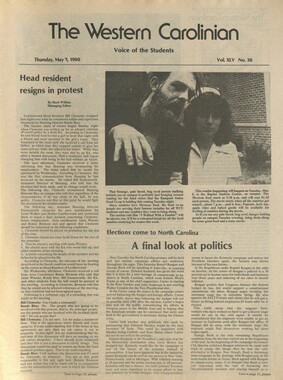Western Carolina University (20)
View all
- Canton Champion Fibre Company (2308)
- Cherokee Traditions (293)
- Civil War in Southern Appalachia (165)
- Craft Revival (1942)
- Great Smoky Mountains - A Park for America (2767)
- Highlights from Western Carolina University (430)
- Horace Kephart (941)
- Journeys Through Jackson (154)
- LGBTQIA+ Archive of Jackson County (26)
- Oral Histories of Western North Carolina (314)
- Picturing Appalachia (6772)
- Stories of Mountain Folk (413)
- Travel Western North Carolina (160)
- Western Carolina University Fine Art Museum Vitreograph Collection (129)
- Western Carolina University Herbarium (92)
- Western Carolina University: Making Memories (708)
- Western Carolina University Publications (2283)
- Western Carolina University Restricted Electronic Theses and Dissertations (146)
- Western North Carolina Regional Maps (71)
- World War II in Southern Appalachia (131)
University of North Carolina Asheville (6)
View all
- Allanstand Cottage Industries (62)
- Appalachian National Park Association (53)
- Bennett, Kelly, 1890-1974 (1388)
- Berry, Walter (76)
- Brasstown Carvers (40)
- Carver, George Washington, 1864?-1943 (26)
- Cathey, Joseph, 1803-1874 (1)
- Champion Fibre Company (233)
- Champion Paper and Fibre Company (297)
- Cherokee Indian Fair Association (16)
- Cherokee Language Program (22)
- Crowe, Amanda (40)
- Edmonston, Thomas Benton, 1842-1907 (7)
- Ensley, A. L. (Abraham Lincoln), 1865-1948 (275)
- Fromer, Irving Rhodes, 1913-1994 (70)
- George Butz (BFS 1907) (46)
- Goodrich, Frances Louisa (120)
- Grant, George Alexander, 1891-1964 (96)
- Heard, Marian Gladys (60)
- Kephart, Calvin, 1883-1969 (15)
- Kephart, Horace, 1862-1931 (313)
- Kephart, Laura, 1862-1954 (39)
- Laney, Gideon Thomas, 1889-1976 (439)
- Masa, George, 1881-1933 (61)
- McElhinney, William Julian, 1896-1953 (44)
- Niggli, Josephina, 1910-1983 (10)
- North Carolina Park Commission (105)
- Osborne, Kezia Stradley (9)
- Owens, Samuel Robert, 1918-1995 (11)
- Penland Weavers and Potters (36)
- Roberts, Vivienne (15)
- Roth, Albert, 1890-1974 (142)
- Schenck, Carl Alwin, 1868-1955 (1)
- Sherrill's Photography Studio (2565)
- Southern Highland Handicraft Guild (127)
- Southern Highlanders, Inc. (71)
- Stalcup, Jesse Bryson (46)
- Stearns, I. K. (213)
- Thompson, James Edward, 1880-1976 (226)
- United States. Indian Arts and Crafts Board (130)
- USFS (683)
- Vance, Zebulon Baird, 1830-1894 (1)
- Weaver, Zebulon, 1872-1948 (58)
- Western Carolina College (230)
- Western Carolina Teachers College (282)
- Western Carolina University (1794)
- Western Carolina University. Mountain Heritage Center (18)
- Whitman, Walt, 1819-1892 (10)
- Wilburn, Hiram Coleman, 1880-1967 (73)
- Williams, Isadora (3)
- Cain, Doreyl Ammons (0)
- Crittenden, Lorraine (0)
- Rhodes, Judy (0)
- Smith, Edward Clark (0)
- Appalachian Region, Southern (2399)
- Asheville (N.C.) (1917)
- Avery County (N.C.) (26)
- Blount County (Tenn.) (161)
- Buncombe County (N.C.) (1671)
- Cherokee County (N.C.) (283)
- Clay County (N.C.) (555)
- Graham County (N.C.) (233)
- Great Smoky Mountains National Park (N.C. and Tenn.) (510)
- Haywood County (N.C.) (3522)
- Henderson County (N.C.) (70)
- Jackson County (N.C.) (4692)
- Knox County (Tenn.) (25)
- Knoxville (Tenn.) (12)
- Lake Santeetlah (N.C.) (10)
- Macon County (N.C.) (420)
- Madison County (N.C.) (211)
- McDowell County (N.C.) (39)
- Mitchell County (N.C.) (132)
- Polk County (N.C.) (35)
- Qualla Boundary (981)
- Rutherford County (N.C.) (76)
- Swain County (N.C.) (2113)
- Transylvania County (N.C.) (247)
- Watauga County (N.C.) (12)
- Waynesville (N.C.) (73)
- Yancey County (N.C.) (72)
- Aerial Photographs (3)
- Aerial Views (60)
- Albums (books) (4)
- Articles (1)
- Artifacts (object Genre) (228)
- Bibliographies (1)
- Biography (general Genre) (2)
- Cards (information Artifacts) (38)
- Clippings (information Artifacts) (191)
- Crafts (art Genres) (622)
- Depictions (visual Works) (21)
- Design Drawings (1)
- Drawings (visual Works) (184)
- Envelopes (73)
- Facsimiles (reproductions) (1)
- Fiction (general Genre) (4)
- Financial Records (12)
- Fliers (printed Matter) (67)
- Glass Plate Negatives (381)
- Guidebooks (2)
- Internegatives (10)
- Interviews (812)
- Land Surveys (102)
- Letters (correspondence) (1013)
- Manuscripts (documents) (619)
- Maps (documents) (177)
- Memorandums (25)
- Minutes (administrative Records) (59)
- Negatives (photographs) (5835)
- Newsletters (1285)
- Newspapers (2)
- Occupation Currency (1)
- Paintings (visual Works) (1)
- Pen And Ink Drawings (1)
- Periodicals (193)
- Personal Narratives (10)
- Photographs (12976)
- Plans (maps) (1)
- Poetry (7)
- Portraits (1960)
- Postcards (329)
- Programs (documents) (151)
- Publications (documents) (2237)
- Questionnaires (65)
- Scrapbooks (282)
- Sheet Music (2)
- Slides (photographs) (402)
- Songs (musical Compositions) (2)
- Sound Recordings (796)
- Specimens (92)
- Speeches (documents) (15)
- Tintypes (photographs) (8)
- Transcripts (322)
- Video Recordings (physical Artifacts) (23)
- Vitreographs (129)
- Text Messages (0)
- A.L. Ensley Collection (275)
- Appalachian Industrial School Records (7)
- Appalachian National Park Association Records (336)
- Axley-Meroney Collection (2)
- Bayard Wootten Photograph Collection (20)
- Bethel Rural Community Organization Collection (7)
- Blumer Collection (5)
- C.W. Slagle Collection (20)
- Canton Area Historical Museum (2110)
- Carlos C. Campbell Collection (282)
- Cataloochee History Project (65)
- Cherokee Studies Collection (4)
- Daisy Dame Photograph Album (5)
- Daniel Boone VI Collection (1)
- Doris Ulmann Photograph Collection (112)
- Elizabeth H. Lasley Collection (1)
- Elizabeth Woolworth Szold Fleharty Collection (4)
- Frank Fry Collection (95)
- George Masa Collection (173)
- Gideon Laney Collection (452)
- Hazel Scarborough Collection (2)
- Hiram C. Wilburn Papers (28)
- Historic Photographs Collection (236)
- Horace Kephart Collection (861)
- Humbard Collection (33)
- Hunter and Weaver Families Collection (1)
- I. D. Blumenthal Collection (4)
- Isadora Williams Collection (4)
- Jesse Bryson Stalcup Collection (47)
- Jim Thompson Collection (224)
- John B. Battle Collection (7)
- John C. Campbell Folk School Records (80)
- John Parris Collection (6)
- Judaculla Rock project (2)
- Kelly Bennett Collection (1407)
- Love Family Papers (11)
- Major Wiley Parris Civil War Letters (3)
- Map Collection (12)
- McFee-Misemer Civil War Letters (34)
- Mountain Heritage Center Collection (4)
- Norburn - Robertson - Thomson Families Collection (44)
- Pauline Hood Collection (7)
- Pre-Guild Collection (2)
- Qualla Arts and Crafts Mutual Collection (12)
- R.A. Romanes Collection (681)
- Rosser H. Taylor Collection (1)
- Samuel Robert Owens Collection (94)
- Sara Madison Collection (144)
- Sherrill Studio Photo Collection (2558)
- Smoky Mountains Hiking Club Collection (616)
- Stories of Mountain Folk - Radio Programs (374)
- The Reporter, Western Carolina University (510)
- Venoy and Elizabeth Reed Collection (16)
- WCU Gender and Sexuality Oral History Project (32)
- WCU Mountain Heritage Center Oral Histories (25)
- WCU Oral History Collection - Mountain People, Mountain Lives (71)
- WCU Students Newspapers Collection (1744)
- Western North Carolina Tomorrow Black Oral History Project (69)
- William Williams Stringfield Collection (2)
- Zebulon Weaver Collection (109)
- African Americans (390)
- Appalachian Trail (35)
- Artisans (521)
- Cherokee art (84)
- Cherokee artists -- North Carolina (10)
- Cherokee language (21)
- Cherokee pottery (101)
- Cherokee women (208)
- Church buildings (167)
- Civilian Conservation Corps (U.S.) (110)
- College student newspapers and periodicals (1830)
- Dams (103)
- Dance (1023)
- Education (222)
- Floods (61)
- Folk music (1015)
- Forced removal, 1813-1903 (2)
- Forest conservation (220)
- Forests and forestry (921)
- Gender nonconformity (4)
- Great Smoky Mountains National Park (N.C. and Tenn.) (181)
- Hunting (38)
- Landscape photography (10)
- Logging (103)
- Maps (84)
- Mines and mineral resources (8)
- North Carolina -- Maps (18)
- Paper industry (38)
- Postcards (255)
- Pottery (135)
- Railroad trains (71)
- Rural electrification -- North Carolina, Western (3)
- School integration -- Southern States (2)
- Segregation -- North Carolina, Western (5)
- Slavery (5)
- Sports (452)
- Storytelling (245)
- Waterfalls -- Great Smoky Mountains (N.C. and Tenn.) (66)
- Weaving -- Appalachian Region, Southern (280)
- Wood-carving -- Appalachian Region, Southern (328)
- World War, 1939-1945 (173)
Western Carolinian Volume 41 Number 03
Item
Item’s are ‘child’ level descriptions to ‘parent’ objects, (e.g. one page of a whole book).
-
-
Voice of the Students VOL. XLI No. 3 THURSDAY, JULY 3, 1975 WESTERN CAROLINA UNIVERSITY CULLOWHEE, NORTH CAROLINA NCASG, USBP meet, discuss Reorganization, Bill of Rights ALL NIGHT NEWS SERVICE- The executive bodies of the N.C. Association of Student Government .NCASG), the Union of Student Body Presidents (USBP) met i Boone at Appalachian State University for a summer organizational meeting. Although the meeting was re stricted to informal business by lack of a quorum, the attending presidents discussed a variety of topics. The need for a complete NCASG reorganization, a coordinated statewide student voter registration effort, and adoption of a uniform student Bill of Rights were Summer school enrollment up Next week's offering in the Western Carolina Lniversity summer theatre program is Jan de Hartog's play, "The Fourposter," starring Greg Whitesides and Jessica Pi. Ips. The play, on which the successful musical "I Do, I Do is based, will be presented Tuesday through Thursday (July 8 - 10) at 8 p.m. in the WCU Little Theatre in Stillwell Building. The script portrays the life history of a couple during the years 1920 - 1955. Tickets cost $1.50 for adults, 75<! for students, and 50 cents for children. Reservations are available by calling the WCU Department of Speech and Theatre Arts at 293-7491. Enrollment figures for the first term of summer school at Western Carolina University indicate a record-high total of 2,939 students, an increase of 18 percent over last year's previous record of 2,499 during the same period. Dr. Jerry Rice, WCU director of summer school, said the final totals would be even higher, since the count does not include some additional short courses and workshops during the first term, which ends July 11. According to Dr. Rice, the totals include head count enrollment in courses on the campus here and in WCU programs in Asheville, Summer school enrollment includes 1,554 men and 1,385 women, he said, and nearly one-third of the students—941— are studying at the graduate level. Based on current rates of acceptances, WCU officials expect an eight to ten percent increase in enrollment for the fall quarter, which last year totalled 5,934. Project Early Bird: testing ground by Erik Kirzinger The young co-ed slowly approached the busy traffic intersection in front of the Cullowhee Post Office. In her right hand she carries a white and red cane — the telltale sign of a visually impared student. Not that longago society generally tended to overlook persons with visual im- parements. Now, however, thanks to programs such as WCU's "Project Early Bird," these people are being absorbed into the mainstream of American life rather than isolated and left out. In an effort to familiarize the visually impared prospective freshmen to the rigors of college life, Project Early Bird was begun at WCU in the summer of 1967. Western was selected over the other colleges and universities in the state because of its difficult campus layout. Early Bird's director, Minor Wilson, explained, "If the students can learn to negotiate a difficult campus like Western has, then he would be more likely to adapt to another campus." There are 29 students participating in this year's project. Wilson said that over the nine years the program has been in effect at WCU, there has been between 27 to 30 students enrolled yearly. The students will spend four weeks at Western attending regular summer school classes. Wilson explained the purpose of the project: "This is the place where the visually impared students have a chance to decide whether they want to go to college and compete with sighted students." After the summer session is over, those students electing to go on to college will transfer to the school of their choice. Amongthe colleges and universities the students are planning on attending this fall include: George Washington University, Wake Forest, UNC-Chapel Hill.NCSU, Appalachian State University, NC Central and a southeastern seminary. The majors elected by the students range from nuclear engineering to pre-med. Four years ago 50 per cent of the visually impared students who entered college dropped out. Now, however, that rate has been reduced to about 10 per cent, according to Wilson. Programs like Early Bird, he added, have been a definite contributing factor in the reduction. Leigh Goodrun, assistant director of the project and a WCU rising senior, said that her experiences with Early Bird have been extremely valuable. "I think it was very worthwhile as far as it helped me a lot." WCU is the only college in the state to offer a summer orientation program for college bound visually handicapped students. In fact, the Early Bird program here was one of the first of its type in the country, according to Wilson. He added that many observers from various states TURN TO PAGE 2 primary among the topics. President Bill Bates (UNC- Chapel Hill) stressed the need for cooperation' among the institutions. "The smaller schools will benefit most from their participation. The larger schools, due to greater resources and economy of scales, have more refined student service programs. Smaller universities will be able to profit from our experiences." Services referred to by Bates included refrigerator and calculator leasing, sporting and recreational equipment rental, student legal and financial assistance, and other services designed for the betterment of student life. WCU student body president, Mike Killam later said "I have come away with some good feelings about the association. lam optimistic that the NCASG will benefit the participating SGAs. The collective resources of the SGAs will enable the voice of all SGAs to be heard statewide," In discussing the need for the revamping of the role of the assembly, the counterpart of the USBP, the presidents sought means of establishing an effective advisory body. Theassem- bly is currently a non-legislative coalition, made up of students from the dues-paying members of the constituent universities. Appointments to the assembly are made by the SGA presidents. Each member school is allowed one representative per 2500 students. The major portion of the work done by the assembly is in its various committees. The committees research programs and problems, then send proposals to the assembly. Upon assembly passage of a proposal it is sent to the USBP for review. Acceptance of the proposal is left to the discretion of the USBP. Problems of accurate role definition in the past have made the body a worthless component of the systems, it was discussed. Describingpastafflictions of the assembly as "ego conflicts" and "power plays", Mary Beth Spina (NCSU) proposed "a situation in which the NCASG will behave as a bicameral operation with a solidarity of a unicameral body. The assembly has been an advisor to the USBP and should remain so. It is our job to create an environment condu- TURN TO PAGE 4
Object
Object’s are ‘parent’ level descriptions to ‘children’ items, (e.g. a book with pages).
-
The Western Carolinian is Western Carolina University's student-run newspaper. The paper was published as the Cullowhee Yodel from 1924 to 1931 before changing its name to The Western Carolinian in 1933.
-
